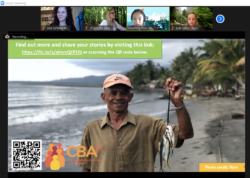Climate change and COVID-19—two existential threats of the current generation—share one major thing in common: to solve them, we must commit to behaving differently. To protect ourselves and others from the virus, we must wear masks. To minimize our climate impacts, we must adopt climate-friendlier policies and practices, like conserving our natural resources and reducing food waste. And to ensure that we can adapt to climate change, or ‘build back better’ from COVID-19, we must elevate nature-based solutions and empower community-led efforts to tackle these threats.
Rare recently attended the International Conference on Community-based Adaptation to Climate Change (CBA14) to highlight the importance of investing in nature and local leadership to build social, ecological, and economic resilience to climate change. CBA14, held virtually in late September and strategically concurrent to Climate Week NYC, reinforced the urgent and continued need to tackle climate change despite other threats like the pandemic. As the only conference focused on community-based adaptation to climate change, CBA14 uniquely positions local leaders and their communities—those most vulnerable to climate change’s impacts—as key to championing nature-based climate solutions that last.
Rare and Local Leaders at CBA14: Lessons for Building Back Better from COVID-19

Throughout the conference, Rare highlighted the local leaders and coastal fishing communities working on nature-based solutions, such as protecting their coral reefs and mangrove forests, through Fish Forever. Fish Forever—Rare’s coastal fisheries program—inspires local leaders to protect the mangrove forests critical to carbon capture and the coral reefs that reduce vulnerability to climate change’s impacts. The program also encourages fishers to shift away from destructive practices that damage or destroy these important ecosystems.
As evidenced in Fish Forever survey results related to the pandemic’s impact on coastal fishing communities, NbS can support short-term economic recovery by safeguarding critical sectors like tourism and small-scale fisheries. But in the long-term, management strategies that integrate NbS can improve livelihoods, food security, coastal protection, and reduce impacts from the pandemic.
Rare co-hosted a session, together with select members of the Friends of Ecosystem-based Adaptation (FEBA), entitled “Community-led Nature-based Solutions for Adaptation: Lessons for Building Back Better from COVID-19“. As the name implies, this session—well-attended by representatives from community groups, national and sub-national government, and grassroots practitioners—focused on lessons from practitioners. Rare’s breakout discussion within the session reflected on significant elements that those implementing and supporting NbS projects should consider, such as empowering women to integrate nature-based solutions in their community and co-manage their natural resources using a science-based approach that incorporates traditional knowledge.
A local leader who joined Rare’s delegation, Vice Mayor Alfredo Coro II, a Fish Forever partner in the Philippines’ Del Carmen Municipality, shared his insights and lessons learned from the frontlines. Mayor Coro emphasized NbS as a critical management tool to address climate change and pandemics. He also stressed the importance of clearly communicating the benefits of a nature-based approach to facilitate co-ownership, demonstrate its long-term value, and enhance buy-in from local leadership. “In our [local government’s] experience, supporting NGOs like Rare helps us frame locally relevant policies [i.e., support nature-based solutions] and influence the behaviors of constituencies.”
“In our [local government’s] experience, supporting NGOs like Rare helps us frame locally relevant policies [i.e., support nature-based solutions] and influence the behaviors of constituencies.”
As a decision-maker, Mayor Coro further highlighted the importance of good governance in championing these solutions and underscored the need to make scientific data accessible and transparent to improve decision-making. He also urged the international community and local municipalities to develop innovative solutions and sustainable investments for financing nature-based solutions. This video from Bloomberg Philanthropies’ Vibrant Oceans Initiative (VOI) showcases how mayors like Mayor Coro are working with local communities to protect fishing resources and promote sustainable fishing practices—despite the pandemic.